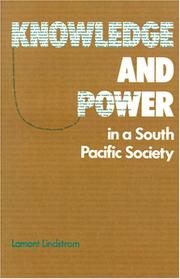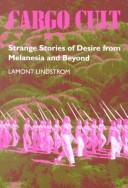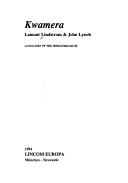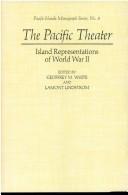| Listing 1 - 10 of 30 | << page >> |
Sort by
|

ISBN: 0874743575 0874743656 Year: 1990 Publisher: Washington : Smithsonian Institution Press,
Abstract | Keywords | Export | Availability | Bookmark
 Loading...
Loading...Choose an application
- Reference Manager
- EndNote
- RefWorks (Direct export to RefWorks)
Cargo movement --- Language and culture --- Tanna (Vanuatu people) --- Culte du cargo --- Langage et culture --- Tanna (Peuple Vanuatu) --- -Tanna (Peuple Vanuatu) --- Politics and government --- Psychology --- Politique et gouvernement --- Psychologie --- Cargo cults --- Tanna (Ni-Vanuatu people) --- Politics and government. --- Psychology.

ISBN: 0824878957 0824815262 Year: 1993 Publisher: University of Hawai'i Press
Abstract | Keywords | Export | Availability | Bookmark
 Loading...
Loading...Choose an application
- Reference Manager
- EndNote
- RefWorks (Direct export to RefWorks)
Book
ISBN: 0824886666 0824886682 0824886690 Year: 2020 Publisher: University of Hawai'i Press
Abstract | Keywords | Export | Availability | Bookmark
 Loading...
Loading...Choose an application
- Reference Manager
- EndNote
- RefWorks (Direct export to RefWorks)
"This book introduces the vibrant living culture and fascinating history of Tanna, an island in Vanuatu, Melanesia, through the stories of a dozen interconnected Tanna Islanders. Tracing the past 250 years of island experiences that cross the globe, each of these distinctly extraordinary lives tells larger human narratives of cultural continuity and change. In following Tanna's times, we find that all of us, even those living on seemingly out-of-the-way Pacific Islands, are firmly linked into the world's networks. Each chapter opens with a telling life story then contextualizes that biography with pertinent ethnographic explanation and archival research. Since 1774 Tanna Islanders have participated in events that have captured global anthropological and popular attention. These include receiving British explorer James Cook; a 19th century voyage to London; troubled relations with early Christian missionaries; overseas emigration for plantation labor; the innovation of the John Frum Movement, a so-called Melanesian "cargo cult"; service in American military labor corps during the Pacific War; agitation in the 1970s for an independent Vanuatu; urban migration to seek work in Port Vila (Vanuatu's capital); the international kava business; juggling arranged versus love marriages; and modern dealings with social media and swelling numbers of tourists. Yet, partly as a consequence of their experience abroad, Islanders fiercely protect their cultural identity and continue to maintain resilient bonds with their Tanna homes. Drawing on forty years of fieldwork in Vanuatu, author Lamont Lindstrom offers rich insights into the culture of Tanna. His close relationship with the island's people is reflected in his choice to feature their voices; he celebrates and recounts their stories here in accessible, engaging prose. An ethnographic case study written for students of anthropology, the author has included a concise list of key sources and essential further readings suggestions at the end of each chapter. Tanna Times complements classroom and scholarly interests in kinship and marriage, economics, politics, religion, history, linguistics, gender and personhood, and social transformation in Melanesia and beyond"--
Tanna Island (Vanuatu) --- History. --- Aipere Island (Vanuatu) --- Ipari Island (Vanuatu) --- Anthropology --- Australasian & Pacific history --- anthropology --- Australasian and Pacific history
Book
Year: 2018 Publisher: University of Hawai'i Press
Abstract | Keywords | Export | Availability | Bookmark
 Loading...
Loading...Choose an application
- Reference Manager
- EndNote
- RefWorks (Direct export to RefWorks)
Who is not captivated by tales of Islanders earnestly scanning their watery horizons for great fleets of cargo ships bringing rice, radios and refrigerators - ships that will never arrive? Of all the stories spun about the island peoples of Melanesia, tales of cargo cult are among the most fascinating.The term cargo cult, Lamont Lindstrom contends, is one of anthropology's most successful conceptual offspring. Like culture, worldview and ethnicity, its usage has steadily proliferated, migrating into popular culture where today it is used to describe an astonishing roll-call of people. It's history makes for lively and compelling reading. The cargo cult story, Lindstrom shows, is more significant than it at first appears, for it recapitulates in summary form three generations of anthropological theory and Pacific studies.Although anthropologists' enthusiasm for the notion of cargo cult has waned, it now colors outsiders' understanding of Melanesian culture, and even Melanesians' perceptions of themselves. The repercussions for contemporary Islanders are significant: leaders of more than one political movement have felt the need to deny that they are any kind of cargo cultist.Of particular interest to this history is Lindstom's argument that accounts of cargo cult are at heart tragedies of thwarted desire, melancholy anticipation and crazy unrequited love. He makes a convincing case that these stories expose powerful Western scenarios of desire itself—giving cargo cult its combined titillation of the fascinating exotic and the comfortably familiar.
Book
Year: 2018 Publisher: University of Hawai'i Press
Abstract | Keywords | Export | Availability | Bookmark
 Loading...
Loading...Choose an application
- Reference Manager
- EndNote
- RefWorks (Direct export to RefWorks)
Who is not captivated by tales of Islanders earnestly scanning their watery horizons for great fleets of cargo ships bringing rice, radios and refrigerators - ships that will never arrive? Of all the stories spun about the island peoples of Melanesia, tales of cargo cult are among the most fascinating.The term cargo cult, Lamont Lindstrom contends, is one of anthropology's most successful conceptual offspring. Like culture, worldview and ethnicity, its usage has steadily proliferated, migrating into popular culture where today it is used to describe an astonishing roll-call of people. It's history makes for lively and compelling reading. The cargo cult story, Lindstrom shows, is more significant than it at first appears, for it recapitulates in summary form three generations of anthropological theory and Pacific studies.Although anthropologists' enthusiasm for the notion of cargo cult has waned, it now colors outsiders' understanding of Melanesian culture, and even Melanesians' perceptions of themselves. The repercussions for contemporary Islanders are significant: leaders of more than one political movement have felt the need to deny that they are any kind of cargo cultist.Of particular interest to this history is Lindstom's argument that accounts of cargo cult are at heart tragedies of thwarted desire, melancholy anticipation and crazy unrequited love. He makes a convincing case that these stories expose powerful Western scenarios of desire itself—giving cargo cult its combined titillation of the fascinating exotic and the comfortably familiar.
Book
ISBN: 9780824878955 9780824878962 Year: 2018 Publisher: Honolulu : University of Hawai'i Press,
Abstract | Keywords | Export | Availability | Bookmark
 Loading...
Loading...Choose an application
- Reference Manager
- EndNote
- RefWorks (Direct export to RefWorks)
Who is not captivated by tales of Islanders earnestly scanning their watery horizons for great fleets of cargo ships bringing rice, radios and refrigerators - ships that will never arrive? Of all the stories spun about the island peoples of Melanesia, tales of cargo cult are among the most fascinating.The term cargo cult, Lamont Lindstrom contends, is one of anthropology's most successful conceptual offspring. Like culture, worldview and ethnicity, its usage has steadily proliferated, migrating into popular culture where today it is used to describe an astonishing roll-call of people. It's history makes for lively and compelling reading. The cargo cult story, Lindstrom shows, is more significant than it at first appears, for it recapitulates in summary form three generations of anthropological theory and Pacific studies.Although anthropologists' enthusiasm for the notion of cargo cult has waned, it now colors outsiders' understanding of Melanesian culture, and even Melanesians' perceptions of themselves. The repercussions for contemporary Islanders are significant: leaders of more than one political movement have felt the need to deny that they are any kind of cargo cultist.Of particular interest to this history is Lindstom's argument that accounts of cargo cult are at heart tragedies of thwarted desire, melancholy anticipation and crazy unrequited love. He makes a convincing case that these stories expose powerful Western scenarios of desire itself—giving cargo cult its combined titillation of the fascinating exotic and the comfortably familiar.

ISBN: 3929075059 Year: 1994 Publisher: München LINCOM Europa
Abstract | Keywords | Export | Availability | Bookmark
 Loading...
Loading...Choose an application
- Reference Manager
- EndNote
- RefWorks (Direct export to RefWorks)
Book
ISBN: 0300052138 Year: 1992 Volume: vol *2 Publisher: New Haven london Yale University Press
Abstract | Keywords | Export | Availability | Bookmark
 Loading...
Loading...Choose an application
- Reference Manager
- EndNote
- RefWorks (Direct export to RefWorks)
Kava (Beverage) --- Kava (Boisson) --- Kava (Ceremonie) --- Kava (Drank) --- Kava (Plante) --- Kava ceremonie --- Kava ceremony --- Kava plant --- Ethnology --- Oceania --- Anthropologie sociale et culturelle --- Social life and customs --- Kava plant. --- Kava ceremony. --- Ethnology - Oceania. --- Oceania - Social life and customs.
Book
ISBN: 9781138272224 9781409423294 Year: 2016 Publisher: London Routledge, Taylor & Francis Group
Abstract | Keywords | Export | Availability | Bookmark
 Loading...
Loading...Choose an application
- Reference Manager
- EndNote
- RefWorks (Direct export to RefWorks)

ISBN: 0585279950 0824811461 0824847199 Year: 1989
Abstract | Keywords | Export | Availability | Bookmark
 Loading...
Loading...Choose an application
- Reference Manager
- EndNote
- RefWorks (Direct export to RefWorks)
| Listing 1 - 10 of 30 | << page >> |
Sort by
|

 Search
Search Feedback
Feedback About UniCat
About UniCat  Help
Help News
News